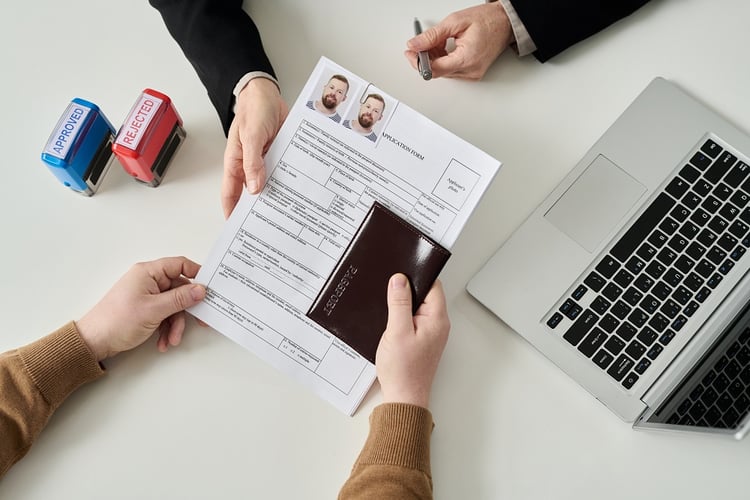
For millions of families across the world, the United States represents a land of hope, opportunity, and a chance to build a better future. Family-based immigration is one of the most common pathways for individuals to achieve this dream. At Novo Legal, our team of dedicated immigration attorneys is committed to providing individuals in Denver and Seattle with educational, informative, and helpful resources to aid in navigating the family-based immigration process to obtain U.S. permanent residency.
In this comprehensive guide, we will explore the various categories of family-based visas, distinguished between Immediate Relative Immigrant Visas (IR-Visas) and Family Preference Immigrant Visas (F-Visas). We will also discuss the role of U.S. citizen and lawful permanent resident sponsors in the family-based immigration process. Additionally, this article will delve into the required forms and documentation necessary for family-based immigration, covering the Petition for Alien Relative (Form I-130), Affidavit of Support (Form I-864), and essential civil and financial documents.
Categories of Family-Based Visas
Two primary categories make up family-based immigration visas in the United States:
- Immediate Relative Immigrant Visas (IR-Visas): This category is exclusive to immediate relatives of U.S. citizens, including spouses, unmarried children under 21 years old, and parents of U.S. citizen petitioners who are at least 21 years old. There is no annual limit on IR-Visas issued, so applicants typically face shorter waiting periods than those in the Family Preference category.
- Family Preference Immigrant Visas (F-Visas): This category covers extended family members of U.S. citizens and lawful permanent residents (LPRs). The number of visas issued in this category is limited each year, resulting in longer waiting periods for applicants. The F-Visas are divided into four separate groups:
- F1: Unmarried sons and daughters of U.S. citizens, and their minor children.
- F2: Spouses, minor children, and unmarried sons and daughters over 21 years old of LPRs.
- F3: Married sons and daughters of U.S. citizens, their spouses, and minor children.
- F4: Brothers and sisters of U.S. citizens aged 21 or older, their spouses, and minor children.
Required Forms and Documentation for Family-Based Immigration
Applying for family-based immigration requires submitting several essential forms and documents:
- Petition for Alien Relative (Form I-130): The U.S. citizen or LPR sponsor must file this form with U.S. Citizenship and Immigration Services (USCIS) to establish the familial relationship between the petitioner and the beneficiary.
- Affidavit of Support (Form I-864): The U.S. citizen or LPR sponsor submits this form to demonstrate their financial ability to support the beneficiary during the beneficiary's initial years in the United States, ensuring they will not become a public charge.
- Civil and Financial Documentation: Family-based immigration applicants must submit various civil and financial documents to support their application, including birth and marriage certificates, divorce decrees (if applicable), police clearance certificates, and evidence of financial stability, such as tax returns and employment records.
Consular Processing Versus Adjustment of Status
Family-based immigration applicants must decide between consular processing and adjustment of status:
- Consular Processing: Applicants residing outside the United States must undergo consular processing at the U.S. embassy or consulate nearest to their residence. This process involves submitting a DS-260 application, attending a medical examination, and participating in an interview with a consular officer.
- Adjustment of Status: Applicants who are already in the United States under a different visa category can apply for an adjustment of status to become a lawful permanent resident. This process involves submitting Form I-485, attending a biometrics appointment, and potentially participating in an interview with USCIS officials.
The Importance of Experienced Legal Guidance
The benefits of having experienced legal guidance during the family-based immigration process include:
- Simplifying the Complex Immigration Process: The U.S. immigration system can be overwhelming and complex. Experienced immigration attorneys can simplify the process by providing step-by-step guidance, ensuring all requirements are met.
- Avoiding Delays, Denials, or Issues with Immigration Forms: Legal representation can help avoid delays, denials, or submission errors for immigration forms, improving the chances of a successful outcome.
- Ensuring a Successful Outcome: Skilled immigration attorneys understand the intricacies of the immigration system and can provide personalized strategies for each unique case, increasing the likelihood of a favorable outcome.
Conclusion
Family-based immigration is a critical pathway for millions of individuals seeking to build a better life in the United States. Understanding the process, visa categories, required documentation, and choosing between consular processing and adjustment of status are vital aspects of the journey. By enlisting the support and representation of an experienced immigration attorney, you can navigate the family-based immigration process with confidence and increase the likelihood of achieving a successful outcome.
If you or a loved one are considering family-based immigration in Denver or Seattle, trust the experienced team of immigration attorneys at Novo Legal to provide the support, guidance, and representation you need to navigate this complex process. Contact us today to schedule a consultation and learn how our expertise can help you achieve your dreams of U.S. permanent residency.



